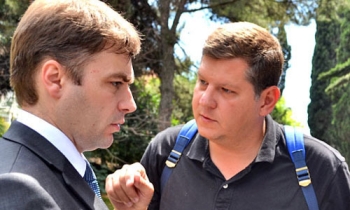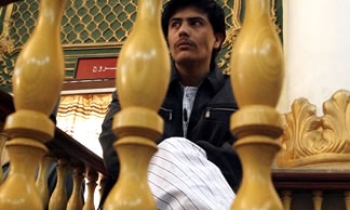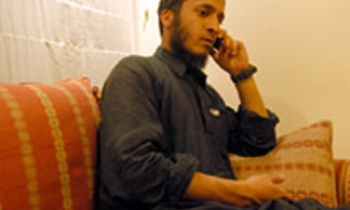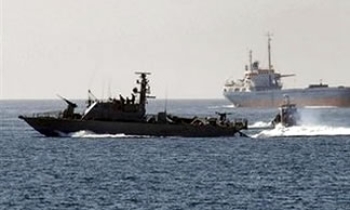The US military is to finally bring a court hearing against Associated Press (AP) photographer Bilal Hussein on December 9, 606 days after the Iraqi was first taken into custody, the agency has reported. The move would be the first legal step in initiating formal charges against Hussein, who was seized in Ramadi on April 12, 2006.
A public affairs officer had notified AP last week that the military intended to submit a written complaint against Hussein as early as November 29. There was no explanation for the change in the date. Under Iraqi law, an investigating judge will receive and review the evidence. The judge, whose role corresponds roughly to a grand jury, has the power to either dismiss the case or recommend it be referred to a three-judge panel for trial.
The court hearing at the Central Criminal Court of Iraq will decide whether there is enough evidence against Hussein to proceed to trial. A Photo District News article earlier this week described the court system as overloaded and rushed, controlled by Shiites, and biased against Suunis such as Hussein.
Pentagon says that it believes Hussein is a “terrorist media operative”, but it has refused to provide any evidence for the accusation, or to even detail the charges that will be brought against him. He and his lawyer will only learn of the charges at the same hearing that they will be expected to present a defence.
However, the US military has indicated that even if he is found innocent, they will still have the right to keep him in prison. If this were to happen, it would confirm suspicions that the US military is willing to arrest and imprison journalists in Iraq who produce photographs deemed to be “unhelpful” to the American war effort. Around one in every 25 of those acquitted in the Iraqi courts continue to be detained by US forces.
“If we deem [Hussein] a threat to the security and stability of Iraq and we decide to detain him further we will do that,” Major Brad Leighton, spokesperson for the Multi-National Force in Iraq, told Photo District News. According to figures obtained by the New York Times, around one in every 25 of those acquitted in the Iraqi courts continue to be detained indefinitely by the US forces. While many journalists in Iraq have been detained by US forces on similar charges to Hussein, most have been released without charge after a couple of months, even when some had known links to insurgents.

Officials at Camp Cropper, where Hussein is currently being held have reportedly admitted that their evidence against him on most of the charges is “weak”, but say they have “irrefutable proof” of his involvement in supplying a false ID card and of conspiring with insurgents to photograph explosions. According to AP, none of Bilal’s 900 submitted photographs over his 20-month employment with AP including explosions.
According to an AP investigation into his arrest, a US interrogator told Hussein: “Your photos present a threat to us”. Referring to photographs taken shortly before his arrest, he allegedly stated: “Do you know what would happen if these photographs were shown in the US ? There would be huge demonstrations and we would have to leave Iraq. This is why you won’t be released.”
The photographer is just one of 18,000 Iraqis currently being held by the US military without charge for “security reasons”. Despite his detention, Hussein has not been interviewed by US or Iraqi authorities since May 2006.
Hussein, 36, who was part of AP’s Pulitzer Prize winning team in 2005 was arrested in April 2006 at his apartment in Ramadi. Initial reports stated that when arrested he was living in a barricaded derelict building with two insurgency leaders. The reports said that Hussein was found with bomb making equipment and a weapons cache.
However, it has since emerged that he was living alone in his fully furnished flat, that there were no explosives or weapons there, and the building was not barricaded. Hussein had let the US soldiers into the building so that they could monitor the street below after a nearby explosion.

The US military pointed to a range of suspicions that attempt to link Hussein to insurgent activity, including claims that he offered to provide false identification to a sniper seeking to evade US-led forces and took photographs that were synchronized with insurgent blasts.
AP's own inquiry found no support for either of those claims. The bulk of the photographs Hussein provided AP were not about insurgent activity; he detailed both the aftermath of attacks and the daily lives of Iraqis in the war zone. There was no evidence that any images were coordinated with the insurgents or showed the instant of an attack.
In a letter delivered last week to Iraq Prime Minister Nouri al-Maliki, AP President and CEO Tom Curley said the AP believes "the real reason for Hussein's detention and incarceration for 19 months without charges is that he produced images of conflict in Anbar Province which the military did not want the citizens of Iraq and the United States to see." The letter also expressed concern that Hussein's attorney had not been given enough time and information to prepare an adequate defense.
"While we are grateful that Hussein will finally have a chance to see and challenge the evidence against him, we are deeply concerned that US military authorities are doing their best to make it difficult for his case to receive a fair hearing," Curley wrote.
“That Hussein has been held for over 19 months without charge and on the pretext of unsubstantiated, shifting allegations is deeply alarming,” said Committee to Protect Journalists (CPJ) Executive Director Joel Simon. “While we welcome the military’s belated attempt to give him his day in court, we are equally alarmed that he continues to be denied due process and that his legal team has no idea what the evidence is against him so they can prepare a proper defence.”
On Wednesday, the Military Reporters & Editors released an open letter it sent to the Pentagon protesting the long confinement of Hussein without the bringing of any charges and calling on the US government to "do the right thing and give Hussein his day in court." It said, "Bilal Hussein's imprisonment is contrary to every notion of justice, fair play and the US Constitution, which every member of America's military swears to uphold and defend."
"We at Military Reporters & Editors wonder how this incident has been allowed to go on for so long," the letter said. "We also wonder if it could happen to other Iraqi journalists who have risked their lives to tell America and the world about life in Iraq. Without their work we would know far less about the fighting there and how it affects both the millions of Iraqis and the thousands American troops, and for that matter, the world.

Hussein’s detention is not an isolated incident. Over the last three years, dozens of journalists—mostly Iraqis — have been detained by US troops, according to CPJ research. While most have been released after short periods, in at least eight cases documented by CPJ Iraqi journalists have been held by US forces for weeks or months without charge or conviction.
In one highly publicised case, Abdul Ameer Younis Hussein, a freelance cameraman working for CBS, was detained after being wounded by US military fire as he filmed clashes in Mosul in northern Iraq on April 5, 2005. US military officials claimed footage in his camera led them to suspect Hussein had prior knowledge of attacks on coalition forces. In April 2006, a year after his arrest, Hussein was freed after an Iraqi criminal court, citing a lack of evidence, acquitted him of collaborating with insurgents.









